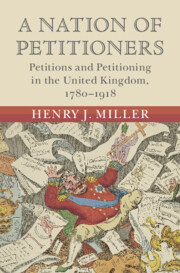Book contents
- A Nation of Petitioners
- Modern British Histories
- A Nation of Petitioners
- Copyright page
- Dedication
- Contents
- Figures
- Tables
- Acknowledgements
- Abbreviations
- Introduction
- Part I Petitions
- Part II Petitioners
- 4 The Right to Petition
- 5 Petitioners I
- 6 Petitioners II
- Part III Petitioning
- Select Bibliography
- Index
4 - The Right to Petition
from Part II - Petitioners
Published online by Cambridge University Press: 02 February 2023
- A Nation of Petitioners
- Modern British Histories
- A Nation of Petitioners
- Copyright page
- Dedication
- Contents
- Figures
- Tables
- Acknowledgements
- Abbreviations
- Introduction
- Part I Petitions
- Part II Petitioners
- 4 The Right to Petition
- 5 Petitioners I
- 6 Petitioners II
- Part III Petitioning
- Select Bibliography
- Index
Summary
The right to petition was the ‘cornerstone’ of all other liberties, petitioners frequently argued. In the UK the right to petition was based on precedent, conventions and popular constitutionalism and was not, as in polities established in revolutionary contexts, a codified constitutional right derived from the idea of popular sovereignty. The right to petition was a contested right formed through a continuous, dynamic struggle between petitioners and Parliament. The right to petition was open to all subjects, and not limited by class, gender, race, literary, property or the franchise. There was little restriction of the content, as opposed to the form, of petitions to Parliament, and the decreasing limitations on petitioning in relation to association and assembly, ensured it became the key mode in connecting, legitimating and underpinning other political activities. Finally, petitioners successfully pressed for a popular, open right to petition, but politicians were able to resist attempts to expand the right of petition into a right of presence or audience. The contest over the right to petition was one of the ways in which politicians sought to retain their discretion and uphold parliamentary sovereignty while acknowledging popular rights.
Keywords
- Type
- Chapter
- Information
- A Nation of PetitionersPetitions and Petitioning in the United Kingdom, 1780–1918, pp. 105 - 131Publisher: Cambridge University PressPrint publication year: 2023



